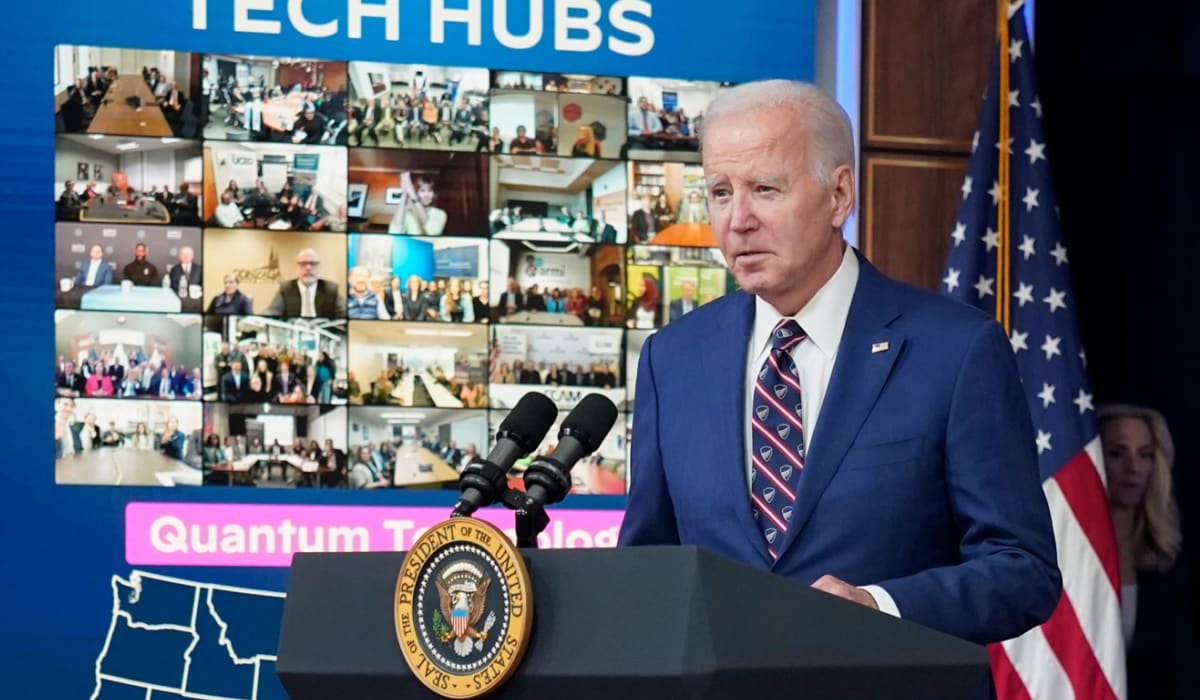Today, President Biden and Secretary of Commerce Gina Raimondo announced the designation of 31 Tech Hubs across the country. Tech Hubs is a program authorized by the CHIPS and Science Act to catalyze investment in technologies critical to economic growth, national security, job creation, and American competitiveness. The program will help develop and grow innovative industries in all regions of the country in sectors ranging from semiconductors to clean energy, critical minerals, biotechnology, artificial intelligence, and more. The Tech Hubs program is a key part of the Administration’s Bidenomics strategy to grow the economy from the bottom up and middle out and the Investing in America agenda to advance economic development in every region across the country.
See Coverage Below:
Associated Press: Biden names technology hubs for 32 states and Puerto Rico to help the industry and create jobs
[Darlene Superville, 10/23/2023]
The Biden administration is designating 31 technology hubs touching 32 states and Puerto Rico to help spur innovation and create jobs in the industries that are concentrated in these areas. The tech hubs are the result of a process Raimondo’s department launched in May to distribute a total of $500 million in grants to cities.
The $500 million came from a $10 billion authorization in last year’s CHIPS and Science Act to stimulate investments in new technologies such as artificial intelligence, quantum computing, and biotech. The program, formally the Regional Technology and Innovation Hub Program, ties into the president’s economic argument that people should be able to find good jobs where they live. That opportunity should be spread across the country, rather than be concentrated.
Reuters: Biden administration picks 31 regional tech hubs to spur US innovation
[David Shepardson, 10/23/2023]
The U.S. Commerce Department said on Monday it was naming 31 regional tech hubs from 370 applicants, making the areas eligible for $500 million in federal funding to help spur innovation across a variety of sectors. The program is part of President Joe Biden’s belief the government should help fund key sectors to attract more private sector investments in industries like electric vehicle battery production, semiconductors and clean energy.
White House National Economic Director Lael Brainard said the regional tech program makes “smart public investments in critical technologies in every region of the country.” The designated regional tech hubs are in places like Montana, Wisconsin, upstate New York, Vermont, Nevada, Illinois and Puerto Rico, and are focused on areas including semiconductors, clean energy, critical minerals, biotechnology, artificial intelligence and quantum computing.
NBC News: White House announces 31 tech hubs to focus on AI, clean energy and more
[Megan Lebowitz, 10/23/2023]
The White House on Monday announced it is designating 31 technology hubs in an effort to improve American competitiveness in the technology sector. The move was authorized under the CHIPS and Science Act, the White House said, which President Joe Biden frequently touts as a highlight of his economic agenda. The act, which the president signed in August 2022, aimed to improve semiconductor manufacturing and supply chains in the U.S. It also authorized $10 billion to invest in technology hubs nationwide.
The hubs focus on a wide range of technological areas, including quantum computing, artificial intelligence, clean energy, medicine and biotechnology. The location of the hubs spans 32 states and Puerto Rico and include areas with a tribal government, coal communities and states with smaller populations, according to the U.S. Economic Development Administration.
Bloomberg: Biden Administration Chooses 31 Tech Hubs to Spur Investment
[Mackenzie Hawkins, 10/23/2023]
The Biden administration has designated 31 regions across the country as technology hubs, a stamp of approval that’s meant to marshal private capital into core areas of federal investment.
Just a handful of the designees will receive government funding set aside in last year’s Chips Act, a massive government effort to boost US manufacturing of critical electronic components after decades of production abroad. The tech hubs span not just semiconductors but also electric vehicles, critical minerals, biomanufacturing and clean energy — the key prongs of an industrial policy push the administration has branded Bidenomics.
The Hill: Biden unveils ‘tech hubs’ in 32 states, Puerto Rico
[Alex Gangitano, 10/23/2023]
President Biden on Monday announced 31 new regional tech hubs across the United States to focus on growing industries including semiconductors, clean energy, critical minerals, and artificial intelligence. They aim to grow industries that are “critical to economic growth, national security, and job creation, and will help communities across the country become centers of innovation critical to American competitiveness,” according to the White House.
The hubs include Heartland BioWorks in Indiana, which aims to develop central Indiana into a global leader in biotechnology and biomanufacturing, Baltimore Tech Hub in Maryland, which aims to develop innovative predictive healthcare technologies by applying artificial intelligence to biotechnologies, and the Gulf Louisiana Offshore Wind Propeller in Louisiana, which aims to transition Louisiana’s energy economy from its legacy of oil and gas to offshore wind and renewable energy.
The Boston Globe: Biden administration announces 31 Tech Hubs, including three in New England
[Nick Stoico, 10/23/2023]
Three communities in New England are among 31 across the country that will be designated Tech Hubs, the Biden administration announced Monday, as the federal government seeks to expand economic opportunity and technological innovation into a greater variety of regions. Among the designations selected are the Ocean Tech Hub based in Rhode Island and Massachusetts, the ReGen Valley Tech Hub in New Hampshire, and the Forest Bioproducts Advanced Manufacturing Tech Hub in Maine.
“The Tech Hubs will bring the benefits and opportunities of scientific and technological innovation to communities across the country, with nearly three-quarters significantly benefitting small and rural areas and more than three-quarters directly supporting historically underserved communities,” the statement said.
The Business Journals: Biden administration names 31 regional tech hubs to boost U.S. innovation
[Jim Dallke, 10/23/2023]
The U.S. Department of Commerce on Monday named 31 tech hubs across the country that are now eligible for up to $500 million in federal funds to help increase innovation in more corners of the country. Part of the Biden administration’s Tech Hubs program and authorized by the CHIPS and Science Act, the effort is designed to add jobs and boost technology innovation in cities beyond the traditional powerhouse tech hubs of Silicon Valley and Boston. The program aims to create ’21st century job opportunities in people’s backyards.’
Syracuse The Post-Standard: Syracuse, Rochester and Buffalo win US designation as national tech hub for computer chips
[Mark Weiner, 10/23/2023]
A region that spans Syracuse, Rochester and Buffalo has won a U.S. competition to become one of 31 national tech hubs, a designation that could help unleash billions of dollars in new investment in Upstate New York. President Joe Biden plans to announce the winning regions today, including the Upstate New York consortium. The selection follows a nationwide competition that attracted 378 applications from 48 states and three territories.
The goal of the federal program is to give an economic jolt to rust belt communities like Upstate New York and other places where economies have sputtered in recent decades. In turn, the federal investment is expected to drive the development of new technologies that give the U.S. a competitive edge against other nations, driving economic growth and helping to train a new workforce of tech workers.
Noticel: President Biden will name ‘tech centers’ for 32 states and Puerto Rico
[Carlos Narváez, 10/23/2023]
[TRANSLATED FROM SPANISH]
President Joe Biden will be designating 31 Regional Innovation and Technology Centers (Tech Hubs) in 32 states and Puerto Rico to help stimulate innovation and create jobs in industries that are concentrated in these areas.
The Tech Hubs program was authorized by the CHIPS and Science Act, signed by President Biden in August 2022, and is part of the President’s Bidenomics agenda to grow the economy from the middle out and from the bottom up.
The Baltimore Sun:Baltimore selected as federal tech hub for artificial intelligence and biotechnology
[Lorraine Mirabella, 10/23/2023]
The Baltimore region has been awarded a federal designation as a national tech hub, which could generate hundreds of millions of dollars of investment and create tens of thousands of jobs. The region, which includes Baltimore and seven surrounding counties, was selected as one of 31 cities or regions for the federal Tech Hubs Program, putting the area in line for a share of an estimated $500 million in federal funding over five years.
The designation is expected to generate $4.2 billion in economic impact and 52,000 jobs by 2030, according to estimates from the Greater Baltimore Committee, which organized a bid developed by a 38-member consortium of business and technology leaders. Members of Maryland’s congressional delegation said Monday that they expect the tech hub program to jumpstart high-tech industries and entrepreneurs across the Baltimore region.
Milwaukee Journal Sentinel: Wisconsin health sciences consortium gets federal innovation funds to accelerate biotech industry
[Karl Ebert, 10/23/23]
The Wisconsin Biohealth Tech Hub, selected from hundreds of applications to the federal the Regional Technology and Innovation Hubs program, will receive a $350,000 planning grant. With the designation as a regional hub it now can apply for up to $70 million in federal funds to develop a network of companies, universities, investors and economic development agencies to accelerate advances in biotechnology and personalized medicine.
Boston Globe: Biden administration announces 31 Tech Hubs, including three in New England
[Nick Stoico, 10/23/23]
Three communities in New England are among 31 across the country that will be designated Tech Hubs, the Biden administration announced Monday, as the federal government seeks to expand economic opportunity and technological innovation into a greater variety of regions.
Dallas Morning News: SMU selected as one of 31 federal technology hubs in the country
[Alexandra Skores, 10/23/23]
Called the Texoma Semiconductor Tech Hub, the university will unify existing semiconductor infrastructure by uplifting regional communities, serving Texas and Oklahoma. President Joe Biden and Secretary of Commerce Gina Raimondo are recognizing the communities through the Department of Commerce Economic Development Administration
Las Vegas Review-Journal: Biden administration tabs UNR as ‘Tech hub’
[Jessica Hill, 10/23/23]
The Nevada Lithium Batteries and Other Electric Vehicle Material Loop led by UNR aims to build a globally competitive lithium lifecycle operation that spans the extraction process to the manufacturing and the recycling process of lithium batteries, which are used in electric vehicles.
Cleveland.com: Akron gets White House designation as tech hub for sustainable polymer development
[Staff, 10/23/23]
The Sustainable Polymers Tech Hub led by the Greater Akron Chamber will try to address the severe climate and environmental impacts resulting from the use of fossil fuel-derived polymers (rubbers and plastics) through accelerating U.S. sustainable polymer manufacturing and commercialization.
Minnesota Public Radio: Minnesota among 31 ‘tech hubs’ designated by Biden administration
[Staff, 10/23/23]
The “Minnesota MedTech Hub 3.0” is among the newly designated innovation and technology hubs. It “aims to position Minnesota as a global center for ‘Smart MedTech’ by integrating artificial intelligence, machine learning, and data science into medical technology,” according to the White House announcement.
“We’re going to invest in critical technologies like biotechnology, critical materials, quantum computing, advanced manufacturing — so the U.S. will lead the world again in innovation across the board,” President Joe Biden said. “I truly believe this country is about to take off.”
The Capital Times (Madison, WI): Biden administration chooses Wisconsin as regional tech hub
[Kayla Huynh, 10/23/23]
Wisconsin’s consortium has proposed using the money to improve personalized medicine, an emerging medical approach that tailors health care based on each patient’s genes. The technique uses genomics, imaging technology, artificial intelligence and bioscience, which could help patients heal faster and reduce medical costs, according to the Wisconsin Economic Development Corp.
The money would also go toward the state’s development of theranostics — a combination of the words therapy and diagnostics — which uses biotechnology to simultaneously diagnose and treat certain medical conditions, including cancer and Alzheimer’s disease.
Reno Gazette-Journal: Northern Nevada’s ‘lithium loop’ added to list of 31 regional tech hubs
[Jason Hidalgo, 10/23/23]
Northern Nevada’s burgeoning lithium and battery materials sector received a jolt Monday after being designated as a regional tech hub by the Biden administration.
President Joe Biden named the “Nevada Lithium Batteries and Other EV Material Loop” as one of 31 federally recognized regional tech hubs across the nation. The loop, which includes the greater Reno area and the surrounding region, will be able to qualify for grants to further develop the sector.
The tech hub program is part of efforts by the Biden administration to drive investment in areas outside of major metropolitan hubs.
WTMJ: Wisconsin named tech hub by Biden admin; up to $75 million in funding opens up for state
[Staff, 10/23/23]
Rockwell Automation and GE HealthCare, both big Milwaukee area employers, were part of Wisconsin’s pitch, according to TMJ4 News partners at the Milwaukee Business Journal. So was BioForward Wisconsin and the Wisconsin Economic Development Corp., among other organizations.
Wisconsin’s pitch for federal funding focused on precision medicine and commercialization in the biohealth industry. That includes bioscience, health care and imaging, diagnostics, and digital health care, according to the Milwaukee Business Journal.
KHSB (NBC Kansas City, MO): Kansas City region selected by Biden administration as biologics, biomanufacturing tech hub
[Jack Anstine, 10/23/23]
The tech hubs program was created through the bipartisan Creating Helpful Incentives to Produce Semiconductors and Science Act, which allowed $10 billion for the program over five years.
Missoulian (Montana): Montana officials giddy over state’s selection as ‘tech hub’
[David Erickson, 10/23/23]
Federal officials say that what will be known as the Headwaters Hub will make Montana eligible to compete for a share of $500 million worth of federal funds in order to become a “global leader in smart, autonomous, photonic remote sensing technologies.”
Bozeman and Montana State University appear poised to have a jumpstart on qualifying for the funding, as there are several photonics companies in that area. However, the tech hub will be led by Accelerate Montana, which is based on the University of Montana campus in Missoula.
Spectrum: Biden administration announces new tech hubs to spur innovation nationwide
[Maddie Gannon, 10/23/23]
The White House noted the 31 hubs were chosen from more than 370 applications and the Department of Commerce is also awarding 18 grants to help other communities build economic development plans to compete for a hub designation in future rounds of the program.
The tech hubs are the result of a process Raimondo’s department launched in May to distribute a total of $500 million in grants to cities.
The $500 million came from a $10 billion authorization in last year’s CHIPS and Science Act to stimulate investments in new technologies such as artificial intelligence, quantum computing and biotech.
KGW (NBC Portland, OR): Biden announces technology hubs for 32 states, including Oregon and Washington
[Staff, 10/23/23]
Oregon State University is the lead agency in two hubs: the Corvallis Microfluidics Tech Hub and the Pacific Northwest Mass Timber Tech Hub. Portland State University heads up a third focused on energy storage.
Two more hubs landed in Washington, according to a news release from Gov. Jay Inslee’s office, one of which is another mass timber hub and the other of which will focus on aerospace materials manufacturing.
“The announcement of two new tech hubs within Washington state is a remarkable win for our state’s world-leading timber and aerospace industries,” Inslee said in a statement. “The CHIPS and Science Act is helping us build our competitive edge and we appreciate the support of our congressional delegation in ensuring President Biden’s Investing in America Act includes investments in Washington state.”
WHTR (NBC Indianapolis, IN): Biden designates 31 new Tech Hubs across the US, and 2 of them are in Indiana
[Staff, 10/23/23]
The program is authorized by the bipartisan CHIPS and Science Act and administered by the Department of Commerce’s Economic Development Administration. It “invests directly in burgeoning, high-potential U.S. regions and aims to transform them into globally competitive innovation centers,” according to a statement from the White House.
The two Indiana sites focus on biologics and quantum computing.
The Buffalo News: Buffalo-Rochester-Syracuse region chosen as federal ‘tech hub’ in bid for funding
[Jerry Zremski, 10/23/23]
The Buffalo-Rochester-Syracuse proposal, dubbed the “NY SMART I-Corridor Tech Hub,” will be the only federal tech hub focused on the semiconductor industry, Schumer’s office said.
That is particularly important amid a federal effort to “reshore” the industry, whose tiny but powerful microchips are used in everything from computers to cars. The industry was born in the U.S., but Taiwan, Japan and South Korea now produce more microchips, and China is catching up fast.
St. Louis Post-Dispatch: Biden names technology hubs for 32 states including Missouri
[Darlene Superville, 10/23/23]
Two of the hubs are in Missouri:
- The Critical Minerals and Materials for Advanced Energy (CM2AE) Tech Hub, led by the University of Missouri System, aims to position south-central Missouri as a global leader in critical minerals processing to provide the materials needed to support battery technology.
- The Kansas City Inclusive Biologics and Biomanufacturing Tech Hub, led by BioNexus KC, aims to position eastern Kansas and western Missouri as a global leader in biologics and biomanufacturing, increasing domestic production of life-saving vaccines and other preventative technologies.



















